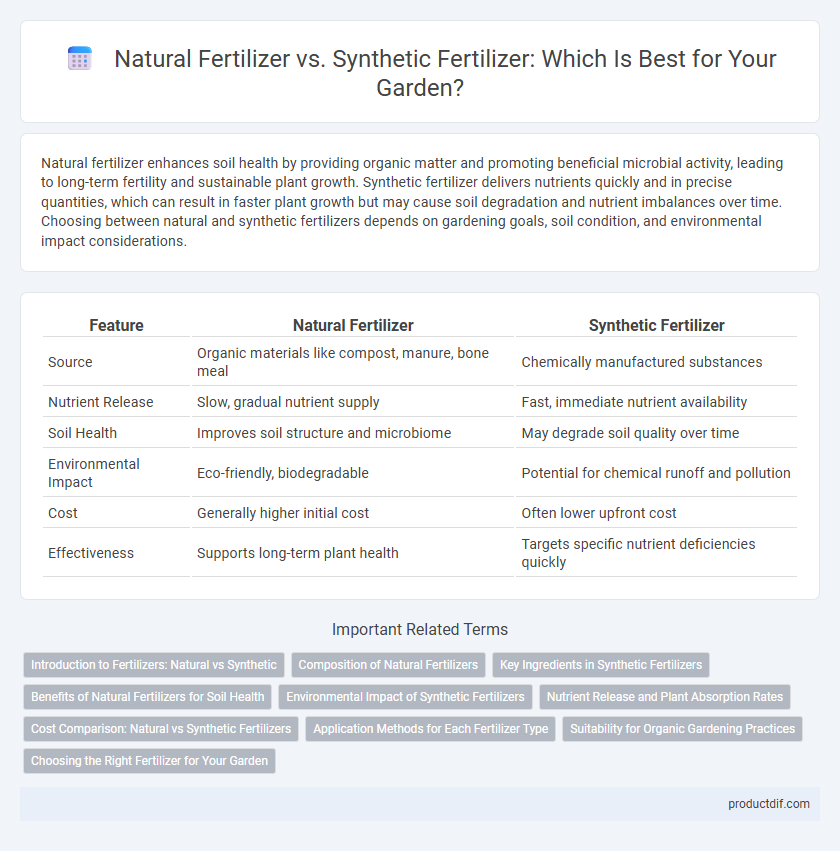Natural fertilizer enhances soil health by providing organic matter and promoting beneficial microbial activity, leading to long-term fertility and sustainable plant growth. Synthetic fertilizer delivers nutrients quickly and in precise quantities, which can result in faster plant growth but may cause soil degradation and nutrient imbalances over time. Choosing between natural and synthetic fertilizers depends on gardening goals, soil condition, and environmental impact considerations.
Table of Comparison
| Feature | Natural Fertilizer | Synthetic Fertilizer |
|---|---|---|
| Source | Organic materials like compost, manure, bone meal | Chemically manufactured substances |
| Nutrient Release | Slow, gradual nutrient supply | Fast, immediate nutrient availability |
| Soil Health | Improves soil structure and microbiome | May degrade soil quality over time |
| Environmental Impact | Eco-friendly, biodegradable | Potential for chemical runoff and pollution |
| Cost | Generally higher initial cost | Often lower upfront cost |
| Effectiveness | Supports long-term plant health | Targets specific nutrient deficiencies quickly |
Introduction to Fertilizers: Natural vs Synthetic
Natural fertilizers, derived from organic matter such as compost, manure, and bone meal, enhance soil health by improving microbial activity and nutrient retention. Synthetic fertilizers, composed of chemically manufactured nutrients like nitrogen, phosphorus, and potassium, provide rapid nutrient availability for targeted plant growth. Understanding the differences in nutrient release, environmental impact, and soil compatibility is essential for effective garden supply management.
Composition of Natural Fertilizers
Natural fertilizers consist of organic materials such as compost, manure, bone meal, and seaweed, rich in essential nutrients like nitrogen, phosphorus, and potassium. These materials decompose slowly, improving soil structure and enhancing microbial activity, leading to long-term soil fertility. Unlike synthetic fertilizers, natural fertilizers supply a balanced mix of micronutrients and trace elements critical for sustainable plant growth.
Key Ingredients in Synthetic Fertilizers
Synthetic fertilizers primarily contain key ingredients such as nitrogen, phosphorus, and potassium, often referred to as NPK, which are essential for plant growth and soil fertility. These fertilizers also include secondary nutrients like calcium, magnesium, and sulfur, as well as trace elements like iron, zinc, copper, and manganese to support comprehensive plant health. Their chemically formulated composition allows for precise nutrient delivery, promoting rapid plant development and high agricultural productivity.
Benefits of Natural Fertilizers for Soil Health
Natural fertilizers improve soil health by enhancing microbial activity and increasing organic matter content, which boosts nutrient retention and soil structure. They release nutrients slowly, reducing the risk of runoff and soil acidification compared to synthetic fertilizers. Long-term use of natural fertilizers promotes sustainable soil fertility and reduces environmental pollution.
Environmental Impact of Synthetic Fertilizers
Synthetic fertilizers contribute significantly to environmental degradation, causing soil acidification, water pollution through nutrient runoff, and disruption of microbial ecosystems. Their production relies heavily on fossil fuels, leading to increased greenhouse gas emissions and climate change acceleration. Overuse of synthetic fertilizers also results in eutrophication of water bodies, harming aquatic life and reducing biodiversity.
Nutrient Release and Plant Absorption Rates
Natural fertilizers release nutrients slowly through microbial activity, ensuring a steady supply that matches plant absorption rates and reduces nutrient leaching. Synthetic fertilizers provide immediate nutrient availability with high solubility, leading to rapid plant uptake but increased risk of runoff and environmental impact. Optimizing garden supply choices depends on balancing nutrient release with plant needs for sustainable growth.
Cost Comparison: Natural vs Synthetic Fertilizers
Natural fertilizers often have a higher upfront cost due to sourcing organic materials, but they improve soil health over time, reducing the need for frequent applications. Synthetic fertilizers are generally less expensive initially and provide quick nutrient delivery, yet long-term use can degrade soil quality and increase costs associated with soil remediation. Evaluating the total expenses requires considering both immediate outlays and future soil management needs.
Application Methods for Each Fertilizer Type
Natural fertilizer is typically applied as compost, mulch, or organic matter directly to the soil surface, allowing gradual nutrient release and improved soil structure. Synthetic fertilizer is often distributed using precise broadcasting, side-dressing, or fertigation techniques to provide immediate nutrient availability and targeted feeding. Choosing the right application method depends on crop type, growth stage, and desired nutrient delivery speed for optimal garden health.
Suitability for Organic Gardening Practices
Natural fertilizers align seamlessly with organic gardening practices by enriching soil health through organic matter and beneficial microbes, enhancing plant growth without synthetic chemicals. Synthetic fertilizers, composed of chemically manufactured nutrients, may offer rapid nutrient availability but often disrupt soil microbial balance and are generally unsuitable for certified organic gardens. Choosing natural fertilizers supports sustainability, promotes long-term soil fertility, and adheres to organic certification standards.
Choosing the Right Fertilizer for Your Garden
Natural fertilizer enriches soil with organic matter, promoting beneficial microbial activity and long-term soil health, making it ideal for sustainability-focused gardeners. Synthetic fertilizer provides precise nutrient formulations for rapid plant growth and immediate nutrient availability, suitable for quick results in nutrient-deficient soils. Selecting the right fertilizer depends on soil condition analysis, desired growth speed, and environmental impact preferences to optimize garden productivity.
Natural Fertilizer vs Synthetic Fertilizer Infographic

 productdif.com
productdif.com